12 Socially Responsible Companies to Applaud
Today, many businesses are prioritizing their environmental, social, and economic impact in a way that’s never been done before. With the goal to serve as a positive global force, companies are increasingly investing in social responsibility initiatives to better serve our society at large.
At Classy, we believe that a company will find its greatest success by marrying purpose and profit. As a Certified B Corporation, we strive to hold ourselves to the highest standard of social and environmental performance for business, motivate other companies to do the same, and celebrate those working to create positive social change.
Create Your Loyal Community With New Insights
Social responsibility is a movement to build a more inclusive and sustainable society and economy, and to preserve the planet through dedicated conservation efforts. Beyond that, it also benefits companies in their recruiting and consumer marketing efforts.
A recent report from Aflac on corporate social responsibility (CSR) found that 77% of consumers are “motivated to purchase from companies committed to making the world better,” and 49% of Americans say it is more important for a company to “make the world a better place” than “make money for its shareholders.”
From B Corps to companies with robust corporate social responsibility programs, for-profit organizations are increasingly motivated to align with relevant causes and social good programs.
It’s important to recognize socially responsible companies to encourage their work and show other organizations how they can successfully incorporate responsible practices into their mission. Use these 12 companies as inspiration to strive for a higher standard and partner with businesses who want to leave the world better than they found it.
Classy
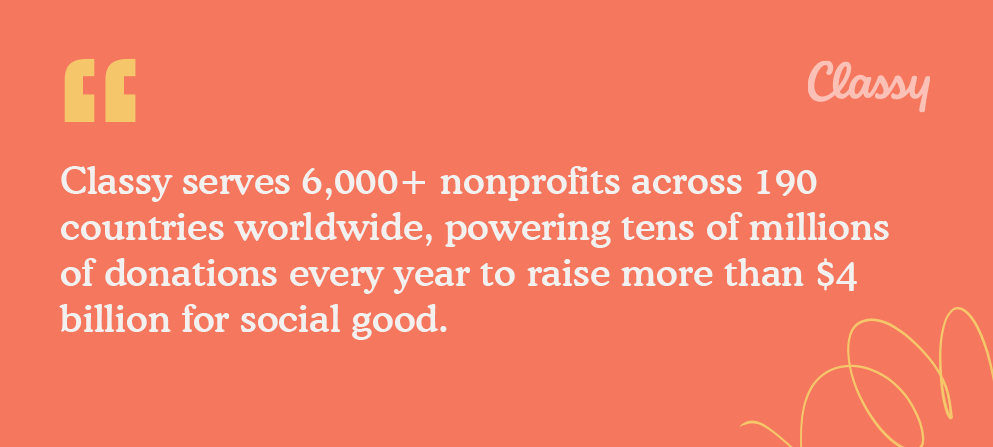
Really, claiming the number one spot? We know how it looks, but here at Classy we hold ourselves to the highest standard and feel grateful for the work we’ve accomplished since our start in 2011.
We support nonprofits and the social sector at large with our online fundraising tools to accelerate social impact around the world.
As a Certified B Corporation, we prioritize our stakeholder promise to empower nonprofits to offer an exceptional giving experience without sacrificing an inclusive work environment or a sustainable future. This philosophy has led to programs like the Classy Awards, now the largest impact awards program in the country, and ClassyGives, an innovative volunteering program for our team and clients.
We continually strive to deliver unquestionable value to all customers and their supporters, in addition to our team, investors, and community. To ensure our operations and impact are sustainable, responsible, and environmentally conscious, we formalized the following company-wide environmental commitments:
- Achieve carbon neutrality
- Achieve supply chain sustainability
- Enable a culture of environmentally conscious stakeholders
We also offer an immersive experience called the Collaborative, our annual nonprofit conference, to help elevate and advance the social sector. This multi-day event is designed exclusively to help nonprofit organizations gain insights, strategies, and inspiration to elevate their impact.
In 2022, the Collaborative returned in person in Philadelphia from June 15 to 16 to provide nonprofit professionals with the opportunity to meet and connect with top leading minds in the industry. For those who preferred to access content digitally, the 2022 Collaborative: Virtual Sessions on Classy Live offered its own unique agenda and speaker line-up to ensure an impactful experience.
Dr. Bronner’s
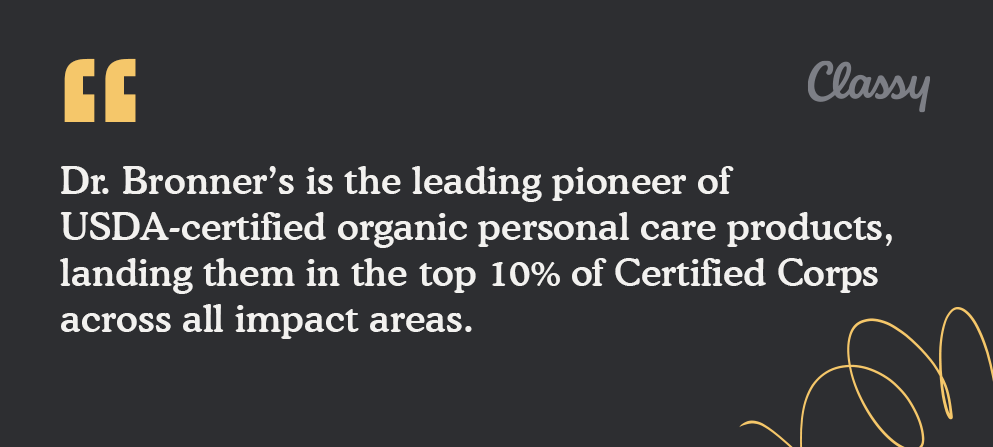
Dr. Bronner’s has been certified as a B Corporation since 2015, holding its manufacturing standards to the greatest level. Now the top-selling brand of organic and fair trade body care in the U.S., this family-owned and run company has steadily risen through the ranks.
This company makes socially and environmentally responsible products of the highest quality, while dedicating its profits to building, promoting, and advancing positive social change.
Dr. Bronner’s is the leading pioneer of USDA-certified organic personal care products, guiding the social responsibility efforts within their industry. Their exemplary societal and environmental impact landed them in the top 10% of Certified Corps across all impact areas, proving that their strategy can lead the way for other companies wanting to join the movement.
To ensure fair and just treatment of farmers and workers worldwide, Dr. Bronner’s continues to offer education initiatives and create fair trade projects to support their mission. They also educate their farming partners in the implementation of carbon-sequestering farming practices and regenerative organic agriculture.
In addition, all of their products are free from synthetic preservatives, petrochemicals, synthetic foaming agents or thickeners, are packaged in 100% recyclable materials, and never tested on animals. Each product is 100% biodegradable, and 33% of all profits go to social and ecological projects.
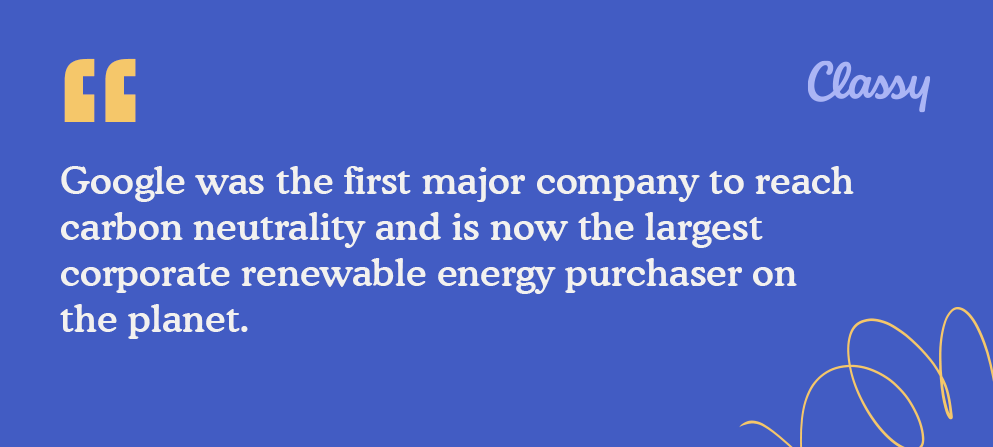
As if carbon neutrality wasn’t enough to earn a spot at the top of the corporate social responsibility totem pole, Google is now aiming to operate solely on carbon-free energy by 2030. Their goal is to not only pursue new carbon-free technologies, but also to demonstrate that a fully decarbonized future is possible for everyone.
From facilitating green commuting, to employee gift matching, to paid time off to volunteer, Google inspects nearly every part of its business with a social impact lens.
Ben & Jerry’s
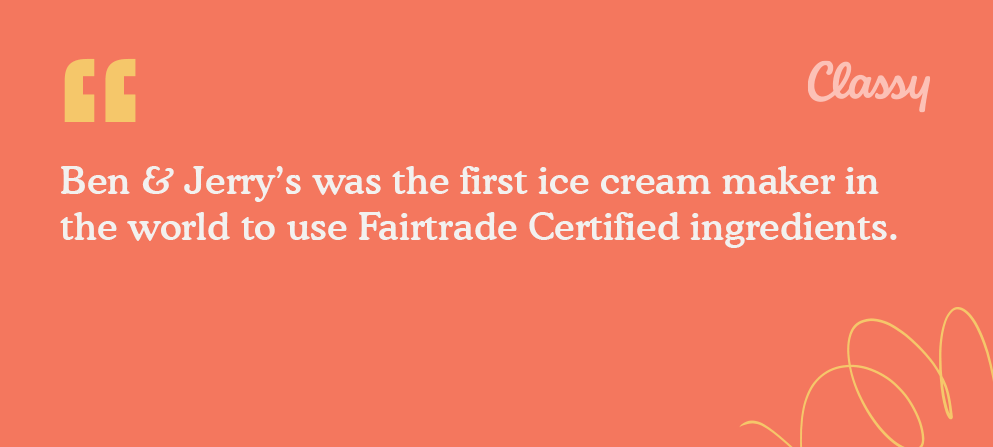
Ice cream tastes just a little sweeter when you know the makers work to promote safe, socially responsible ingredients and business practices. Since the 1980s, Ben & Jerry’s has supported a number of important causes, many of which tie directly to the business of making ice cream.
In 1989, they first opposed Recombinant Bovine Growth Hormone use in cows due to “its adverse economic impact on family farming.” They also use their packaging to support the family farm organization, Farm Aid. The company even created the Ben & Jerry’s Foundation, which encourages its employees to give back to their communities and offers grants for social justice programs.
Ben & Jerry’s commitment to fairtrade motivated the company to become the first ice cream maker in the world to use Fairtrade Certified ingredients. This decision aligns with their values to use environmentally friendly farming practices, implement fair labor standards, and invest in their community.
This company’s impact is then further amplified by the Fairtrade social premium, an additional amount of money paid on top of farmers’ fair price.
LEGO
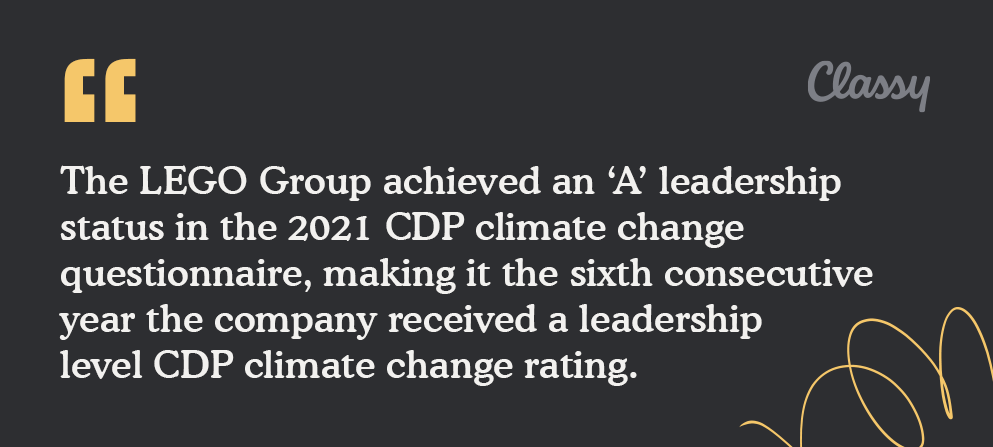
The LEGO Group is one of the most notable examples of how social responsibility can be an incredible asset to a well-known brand. Their dedication to social impact is somewhat recent (a 2014 Greenpeace video put pressure on the toymaker to end their 50-year partnership with Shell Global due to their plans to drill in the Arctic), but the extent of their commitment has made the Danish company a shining example of the far-reaching impact of CSR.
In September of 2020, the LEGO Group announced that they were set to invest $400 million over the next three years to support their social responsibility and sustainability efforts. To deliver on their goal to achieve carbon neutrality, LEGO recently signed an agreement to set up its first-ever carbon neutral plant in Vietnam, with production commencing in 2024.
Developers plan to completely rely on rooftop solar panels and a nearby solar farm to generate all power throughout the facility. Additionally, the company will start by phasing out single-use plastic boxes to make all packaging sustainable by the end of 2025.
The company’s Sustainable Materials Programme will continue to advance, with a focus on expanding its use of bio-bricks. Research into new, more sustainable plastics from renewable and recycled sources is a priority, in addition to partnering with other leaders in the industry to find durable, high-quality materials that keep the environment front of mind.
The LEGO Group is also aiming to reach children around the world with learning through play. In 2021, the LEGO Group, the LEGO Foundation, and UNICEF announced a three-year partnership that will invest $2.5 million in providing resources to community-based family support programs to help caregivers understand the life-long benefits of incorporating play into their everyday lives.
Levi Strauss
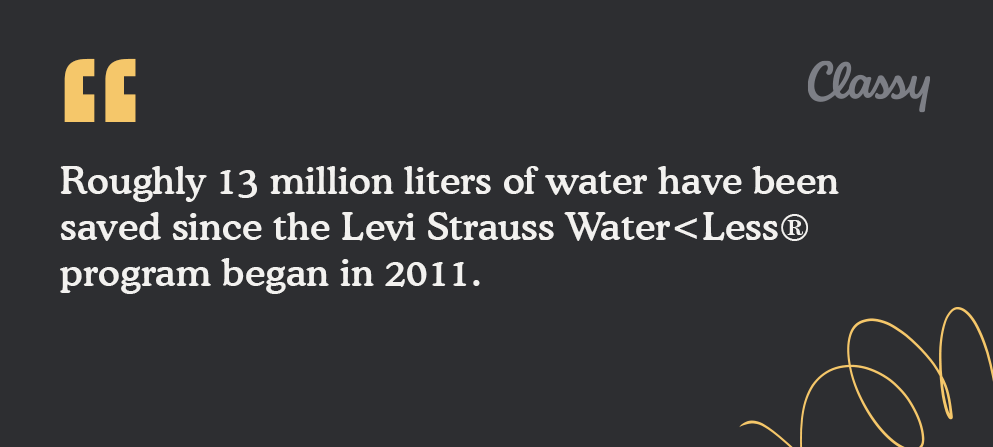
Are your jeans contributing to water scarcity? Most of us probably don’t think about this when shopping, but it’s a critical question for Levi Strauss. In recent years, the company has committed to reducing the amount of water used to produce their jeans, a product they have been making since 1873.
The company created the first product tag in 2009, Care Tag for Our Planet, which offers tips on how to best preserve your clothing and where to donate them once you’re done with them. Levi Strauss works alongside Cotton Inc.’s Blue Jeans Go Green to collect used clothing and sells pre-owned or restored vintage clothing items to reduce their carbon footprint.
As part of their effort to reduce the amount of water being used in manufacturing, Levi Strauss adopted the Water<Less® approach that ensures all key suppliers become distinguished Water<Less® facilities by 2025 to alleviate water stress.
All owned-and-operated U.S. and Canadian retail locations, along with all U.S. wholesale locations, now use 100% post-consumer waste stock for their print materials. Additionally, all new mannequins are made from 100% recycled base stock, and the company is currently piloting recycled denim coat hangers in several locations.
Warby Parker
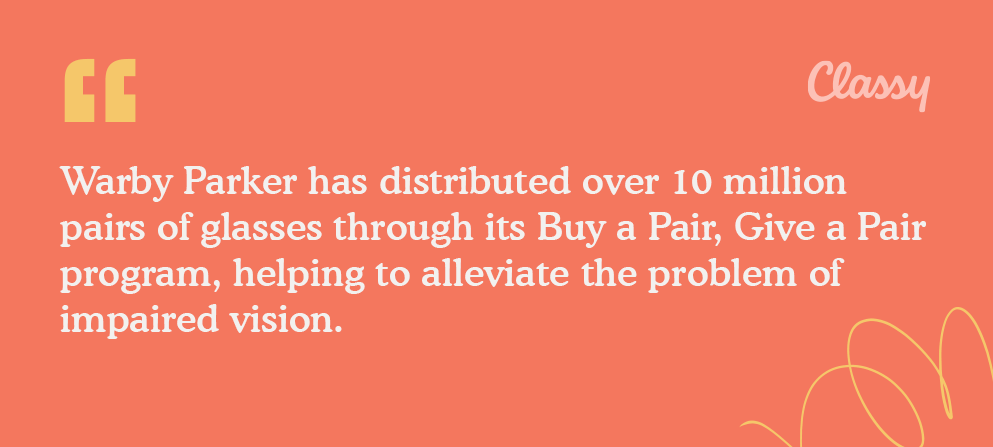
Warby Parker helps simplify the task of finding the right pair of glasses by sending customers five different frames of their choice to try on before making a decision. But knowing that a functional pair of glasses can be life-changing for many people, the B Corp also works to provide glasses for those in need.
Through their Buy a Pair, Give a Pair program, Warby Parker makes a monthly donation to their nonprofit partners, such as VisionSpring, to bring prescription eyewear to people in developing countries. The company has distributed more than ten million pairs of glasses since its start in 2010.
Microsoft
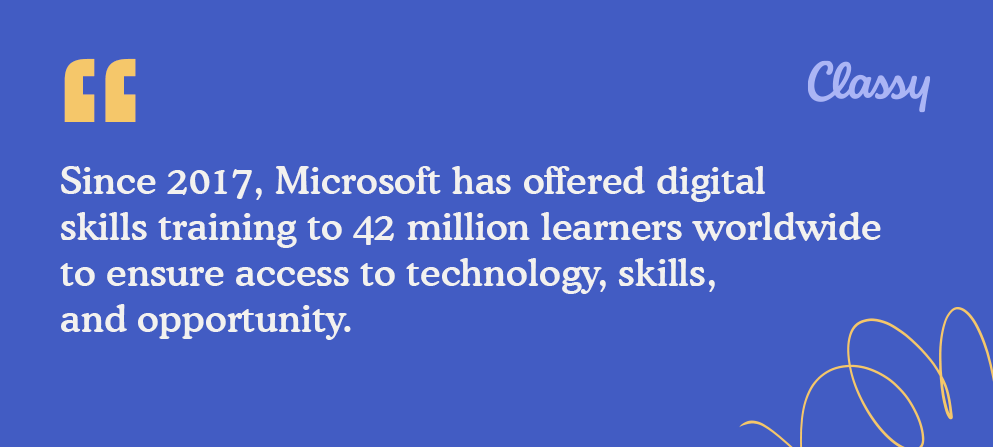
Microsoft changed the way the world works, studies, and plays with its computers and software. But their ambitions go far beyond the screen.
The company, founded by Bill Gates, began its giving program in 1983 when the fledgling company raised $17,000 for charity. As their philanthropy web page explains, Microsoft’s giving program has not only given time (employees in the U.S. volunteered more than 590,000 hours for nonprofits in 2021 alone), but also cash. In the 2021 fiscal year, the program raised over $214 million for nonprofits.
The software giant also created Microsoft Philanthropies, a social good initiative that works with nonprofits, governments, and businesses to create “a future where every person has the skills, knowledge, and opportunity to achieve more.” Initiatives cover everything from providing computer education, offering grants to nonprofits, and forming partnerships with organizations worldwide.
Lemonade
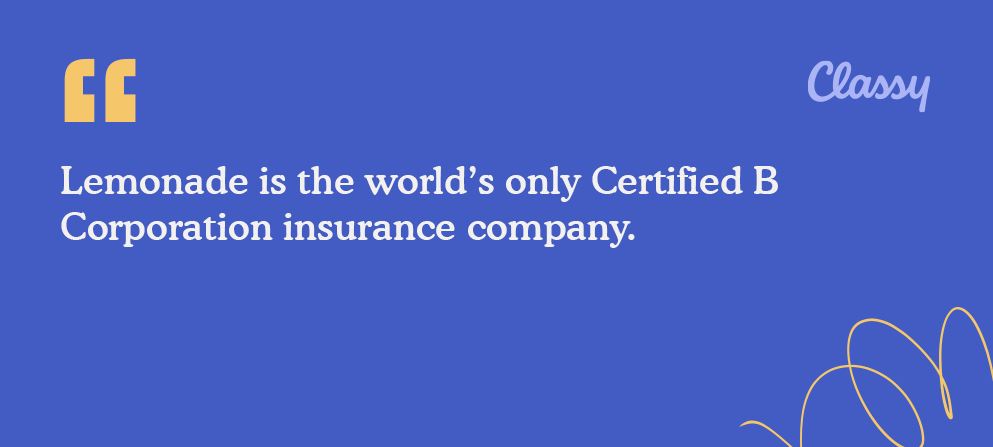
Lemonade serves to rebuild insurance as a social good to its growing customer base. To support their mission, the team launched the Lemonade Giveback.
When you purchase a Lemonade policy, you’re asked to select a nonprofit you care about. Once a year, Lemonade tallies up the unclaimed money left from your insurance premium and donates it to the nonprofit of your choice. In 2021, they gave over $2.3 million to charities including American Forests, Charity: water, CURE Childhood Cancer, and more.
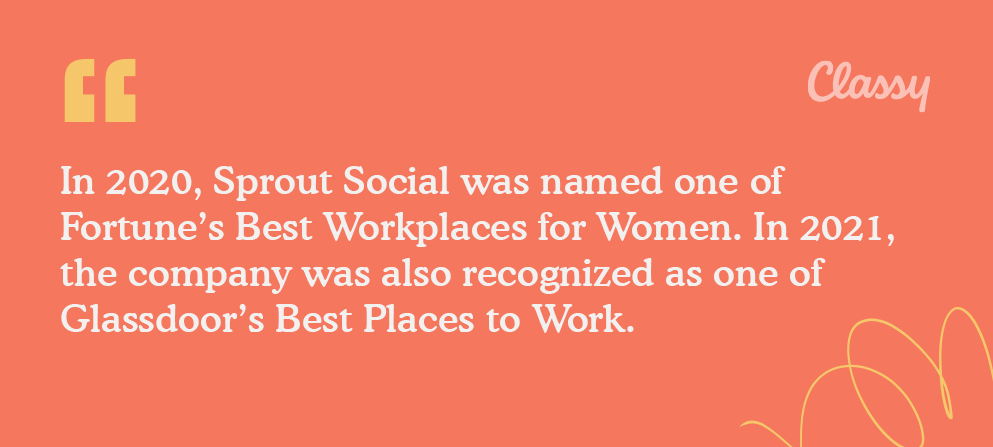
Sprout Social is a social media management and intelligence tool used by over 30,000 brands around the world. The company believes that building best-in-class software and a beloved brand is not just about its product and services, but also about prioritizing integrity, sustainability, and humanity in everything they do.
The company’s values-driven and future-minded approach is grounded in environmental impact, social impact, and governance. To reduce waste and commit to sustainable practices, Sprout Social is proud to report that more than 90% of the electronics they purchase are Energy Star Certified. Additionally, more than 50% of the organizations in their supply chain are carbon neutral or have pledged to be by 2050, and 100% of their U.S. locations are Energy Star Certified buildings.
Social impact is a top priority for the company, which ladders up to its $500,000 annual donation commitment to organizations that fight discrimination and support marginalized communities. To stay open, honest, and accountable, Sprout Social reports on their website that 64% of their executive team and 43% of their Board of Directors is diverse in terms of gender or race.
Stitch Fix
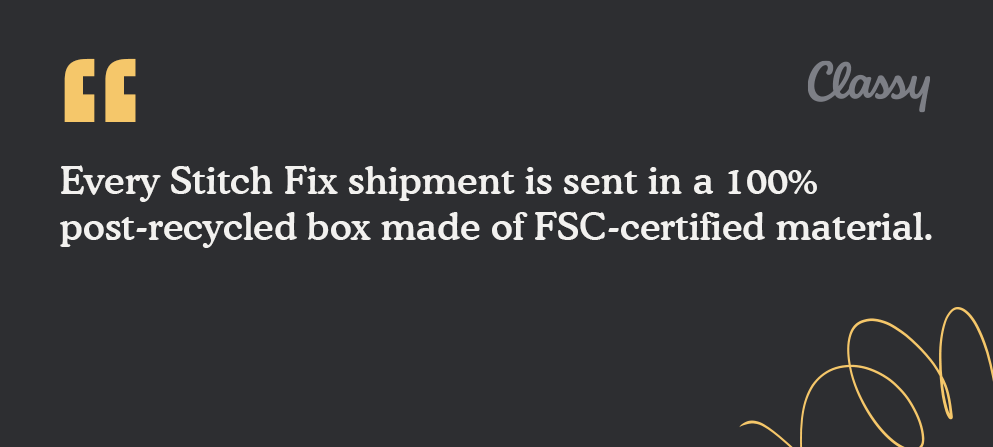
Stitch Fix, an online personal styling service founded in 2011, is taking measurable action toward a healthier planet. From their suppliers to the materials they work with, this company is committed to using the power of data, resources, and partnerships to catalyze change.
By 2025, Stitch Fix plans to source 100% of the main materials in their private label products more sustainably than conventional alternatives. In 2021, the company reached 47% of its total goal.
Each vendor relationship is rooted in their Vendor Code of Ethics. This ensures a shared commitment to minimizing environmental impact and providing working conditions that uphold all labor laws and standards.
Additionally, Stitch Fix’s data-driven inventory model helps reduce waste by understanding what clients want to predict inventory needs more accurately. When excess inventory becomes a problem, the company has partnerships in place to direct products to alternate channels rather than directly to a waste stream.
Purely Elizabeth
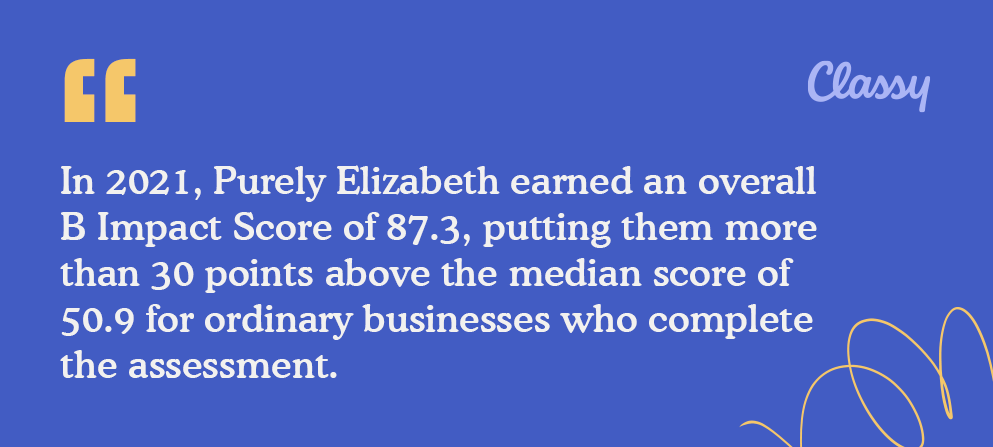
Purely Elizabeth, a booming natural foods company, is a proud Certified B Corporation, continually working to use business as a force for good. The company is on a mission to provide healthier, better-tasting alternatives in a way that best serves the planet and its people.
To start, the company partners with a women-owned coconut sugar supplier in Indonesia and a B Corp-approved granola manufacturing partner to capitalize on the power of collaboration. In addition to its impact on the planet, Purely Elizabeth prioritizes its impact on all employees, customers, and communities through employee volunteer days, flexible time off, and generous benefits packages.
The company approaches sustainability from various angles, including:
- Requiring green standards for the Purely Elizabeth office (e.g., lower water usage, composting, light sensors, reducing overall waste and energy consumption)
- Sharing local resources with remote employees to adapt and uphold sustainable practices
- Upholding non-GMO Verified certification for the majority of Purely Elizabeth products
- Sourcing organic ingredients whenever possible
Additionally, the team ensures they’re always meeting the highest standards of performance, transparency, and accountability by going through an audit every three years to reevaluate their goals, mission, and direction.
Ninety percent of consumers are likely to trust and be loyal to socially responsible companies compared to companies that don’t contribute to positive change, and 92% of consumers want to buy a product that supports a good cause.
Seeing how critical the role of CSR is to brands worldwide, more and more companies are adopting social good initiatives and building them into the framework of their businesses. These organizations show how far-reaching and varied corporate social responsibility programs can be.
Any business can prioritize social impact by donating your product to those in need, fundraising for a worthy cause, or starting your own foundation. Along with the good it does for your community, it also benefits your brand and attracts customers and talented employees.
Perhaps the simplest way to take a philanthropic step is to sponsor a local nonprofit organization. Corporate sponsorships between nonprofits and for-profit businesses can take many forms, so download The Nonprofit’s Guide to Pitching to Corporate Sponsors to learn where to get started.















![Toni Kroos là ai? [ sự thật về tiểu sử đầy đủ Toni Kroos ]](https://evbn.org/wp-content/uploads/New-Project-6635-1671934592.jpg)


